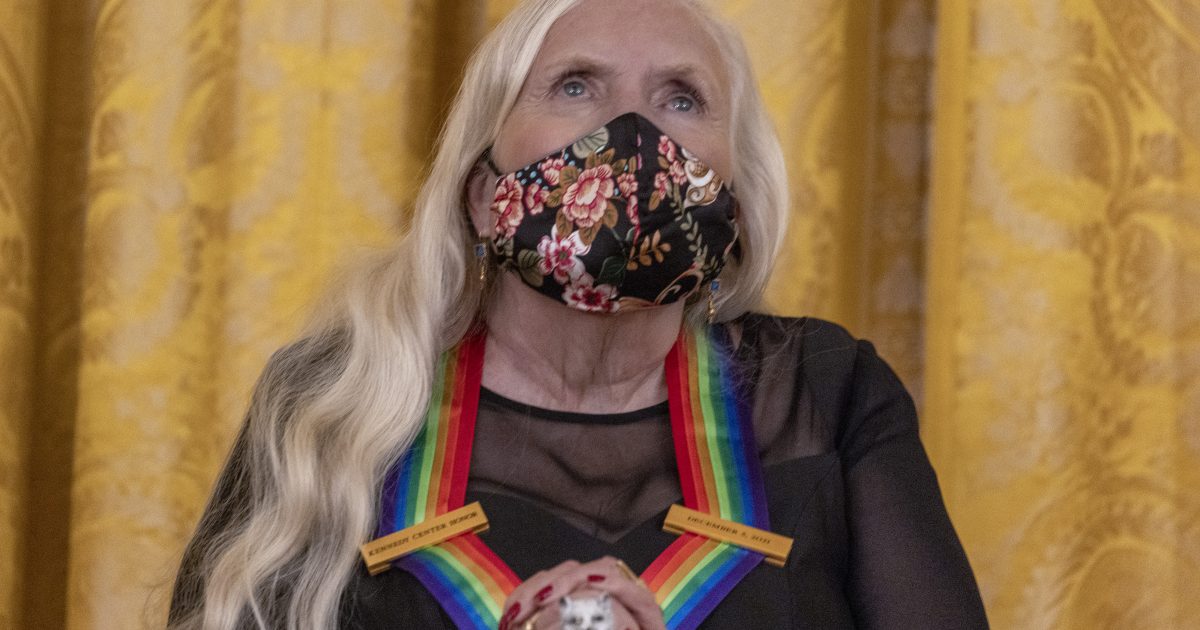Joni Mitchell Perseveres
- Last night at the Kennedy Center Honors, Joni Mitchell, Bette Midler, Berry Gordy, Lorne Michaels and Justino DÃaz, were honored for their contributions to the arts; Mitchell has overcome a number of health battles in her life, including polio as a child.
- Mitchell, 78, also suffered a brain aneurysm in 2015 which left her struggling to walk and talk; she says she is doing “alright.”
- Keeping a positive attitude through health battles can make them easier to bear.


Herbie Hancock, who spoke at the event, said of her working on music through her disease as a child, “So she devised her own tunings, so she can access the emotionally complex chords that she was hearing in her mind.”

In 2015, Mitchell had a brain aneurysm, which nearly took her life. She spoke briefly of her health battles at the Kennedy Center Honors, saying, “This last one (the brain aneurysm) was a real whopper, you know. But you know, I’m hobbling on. I’m doing alright.”
Mitchell’s Brain Aneurysm & Recovery
When Mitchell had her brain aneurysm in 2015, she was at home in Los Angeles, and was later discovered unconscious. Shortly thereafter, she updated fans via her website, saying that she was “resting comfortably” and making “good progress.”
“The aneurysm took away a lot more. [It] took away my speech and my ability to walk.”
In an interview with The Guardian, the celebrated singer spoke about how she was struggling to walk, and that her recovery was going rather slowly. She described her recovery process as “inching along.”
“I got my speech back quickly…”
She said at the time that her primary focus was on her recovery, rather than her music. She told The Guardian, “I haven’t been writing recently. I haven’t been playing my guitar or the piano or anything,” she said. “No, I’m just concentrating on getting my health back.”
She added that she’s an extremely resilient woman, having already been through health challenges at a very young age. “You know what? I came back from polio, so here I am again, and struggling back,” said Mitchell.
She describes how for the second time in her life following a health crisis she was unable to walk. “Once again I couldn’t walk. I had to learn how again. I couldn’t talk,” she explained. “Polio didn’t grab me like that, but the aneurysm took away a lot more, really. Took away my speech and my ability to walk,” said Mitchell. “And, you know, I got my speech back quickly, but the walking I’m still struggling with. But I mean, I’m a fighter. I’ve got Irish blood! So you know, I knew, ‘Here I go again, another battle.'”
What is Polio?
Polio is a life-threatening disease caused by the poliovirus. Like the coronavirus, it spreads from person-to-person contact. It can lead to paralysis, by affecting a person's spinal cord.

The first polio epidemic in the U.S. occurred in 1894, but it wouldn't be until the mid-20th century when a vaccine was widely available and administered.
Another musician, Elvis Presley, was an influencing factor for many people getting the vaccine, as he did publicly in 1956. Two years earlier, the New York City Department of Health launched a widespread publicity campaign to promote the polio vaccine. And by 1963, polio cases in New York City had fallen to zero. Polio is also a key component in the fight against cancer, as some treatments in clinical trials are using the modified poliovirus to treat brain tumors.
Dr. Henry Friedman and his colleagues at Duke University are investigating a new therapy that combines the modified poliovirus and immunotherapy. In an earlier interview with SurvivorNet, Dr. Friedman says, “The modified poliovirus is used to treat this tumor, by injecting it directly into the tumor, through a catheter. It is designed to lyse the tumor and cause the tumor cells to basically break up.”
Strength Through Health Battles
It’s clear that Mitchell is a fighter and a survivor. She’s a role model for all people who are battling a diagnosis like cancer or another serious illness. Despite living through various health battles from the time she was a child to the time of being a mature woman, she has persevered.
Mitchell has not only continued on with life after her brain aneurysm and polio but she’s continued to thrive. When faced with a difficult diagnosis, it’s easy to become mired in feelings of anxiety, depression, hopelessness, and overwhelm but there’s another way to view your health struggles; you can see them as an opportunity to persevere and overcome yet another of life’s challenges.
Learn more about SurvivorNet's rigorous medical review process.


